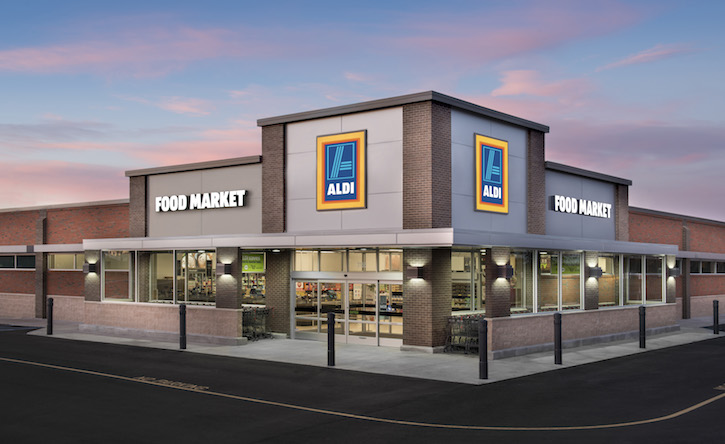The grocery giant is planning to invest a whopping $3.4 billion in expanding the chain across the nation.
The competition in the US grocery market has become even more intense in recent years, and another massive shot has been fired in the ongoing battle. That shot comes courtesy of Germany-based chain Aldi, which has just announced plans for a massive US expansion. How big? As the New York Post explains, the grocery giant is planning to invest a whopping $3.4 billion in expanding the chain across the nation.
Plans call for the store tally to rise from its current count of 1,600 stores across 35 states to 2,500 stores nationwide by the end of 2022. Those are some ambitious goals, but Aldi intends to strike while the iron is hot and capitalize on the formula that has allowed the company to achieve tremendous growth already.
“We pioneered a grocery model built around value, convenience, quality, and selection and now ALDI is one of America’s favorite and fastest growing retailers. We’re growing at a time when other retailers are struggling,” a statement from Aldi CEO Jason Hart read in part. “We are giving our customers what they want, which is more organic produce, antibiotic-free meats and fresh healthier options across the store, all at unmatched prices up to 50 percent lower than traditional grocery stores.”
As of right now, Aldi’s ambitious plans would slide the company into the third slot of biggest US supermarket chains, behind leaders Walmart and Kroger.
“We have passionate fans who know ALDI offers a smarter way to feed their families in a modern, convenient and easy-to-shop environment,” added Hart. “If you’ve never shopped with us, we invite you to come in and discover the ALDI that millions already know and love.”
Analyst Brittain Ladd notes that Aldi is seizing the opportunity being presented. The company will employ an aggressive strategy to insure the growth spurt is a successful one, but he does note that it won’t be as easy as having the lowest prices. “Aldi is gunning for prices 21 percent below competitors in the US,” Ladd said. “A weakness in its discounter model is that they sell many fewer items than traditional grocery stores, requiring customers to shop at more than one retailer for all of their grocery needs.”
Ladd adds that Aldi may wind up considering some additional innovation may be too close the gap, and he mentions home delivery as one of the several options. “I expect that Aldi will invest in e-commerce and duplicate their discount models online at some point in the near future,” he said.
16 JUNE 2017, USA
Source:
New York Post

 Boohoo expands online presence with new marketplace for fashion
Boohoo expands online presence with new marketplace for fashion Victoria's Secret expands presence in Melbourne
Victoria's Secret expands presence in Melbourne Inditex's Bershka set to enter indian market with Mumbai store
Inditex's Bershka set to enter indian market with Mumbai store Ross stores expands across the U.S. with 24 new locations
Ross stores expands across the U.S. with 24 new locations Chaumet opens doors to debut boutique in Italy
Chaumet opens doors to debut boutique in Italy Birkenstock is launching first store in France
Birkenstock is launching first store in France Salomon elevates brand presence with new Paris flagships
Salomon elevates brand presence with new Paris flagships  Amiri expands presence in California
Amiri expands presence in California  Crocs expands its presence in India with Apparel Group
Crocs expands its presence in India with Apparel Group  Best Buy Canada to expand presence with 167 small-format locations
Best Buy Canada to expand presence with 167 small-format locations  Arket expands into Italy with Milan flagship
Arket expands into Italy with Milan flagship